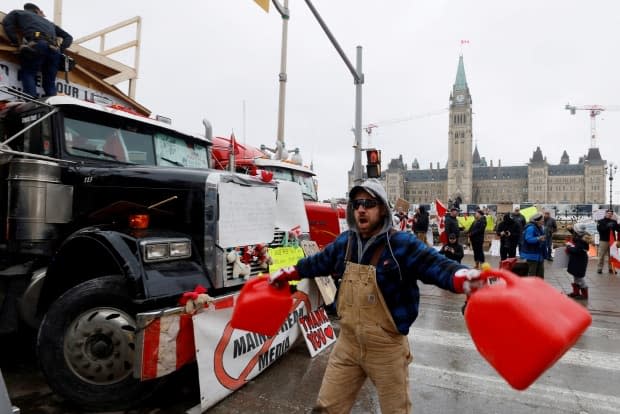Residents abandoned to a violent occupation during 'Freedom Convoy': Report

People in Ottawa-Gatineau mostly told the Ottawa People's Commission that last year's self-described "Freedom Convoy" brought widespread human rights abuses to people in the city's downtown, according to a new report.
The commission, which is separate from federal and city reviews of what happened in Ottawa in January and February 2022, said it wanted to hear from community members about the impact of the protest-turned-occupation about COVID-19 rules and the governments managing of them.
It said in a report released Monday that feedback was largely negative, that people felt unsafe and abandoned to a violent occupation of their neighbourhoods "by force and without their agreement."
"People who live and work in downtown Ottawa endured several weeks of widespread human rights abuse, amidst a climate of threats, fear, sexual harassment and intimidation marked by racism, misogyny, antisemitism, Islamophobia, homophobia, transphobia, and other expressions of hate and intolerance," it said.
"While convoy organizers claimed there was diversity among the participants and supporters, and that was true to a limited extent, it is clear that the overwhelming majority of people involved in the protests were white males."
People told this commission they were driven into by truck drivers, beaten, pushed, chased and threatened. Many felt they either had to remain inside their homes to stay safe from the noise, fumes and people taking up streets or leave the area altogether.

People, including those who are medically or financially vulnerable, lost medical appointments, social services and opportunities to get food when restaurants and grocery stores closed.
Algonquin elders, whose territory the protesters took over, were upset by people disrespecting ceremonies, protocols and movements to remember children killed in residential schools.
All this, the report said, came at a time when almost all attempts to get the city and police to do something were met with inaction.
Local convoy supporters were given the opportunity to talk to the commission, including at sessions set aside for them.
The report's authors said supporters told them life had been hard for them because they didn't want to get vaccinated against COVID-19 and in turn, were allowed to do less. The arrival of the convoy "felt akin to liberation."
Furthermore, they said the events weren't harmful, any noise or travel disruptions were normal and anything bad that happened was the fault of a government that wouldn't listen to them, according to this report's summary.
The commission heard from about 200 people, both in person and in writing. One estimate is that about 15,000 people live in Ottawa's downtown core.
It both started with the premise that the convoy was harmful and disturbing, according to organizers, and then said in this first report that it does not officially oppose or support it.
The next step is a report with recommendations in March.

